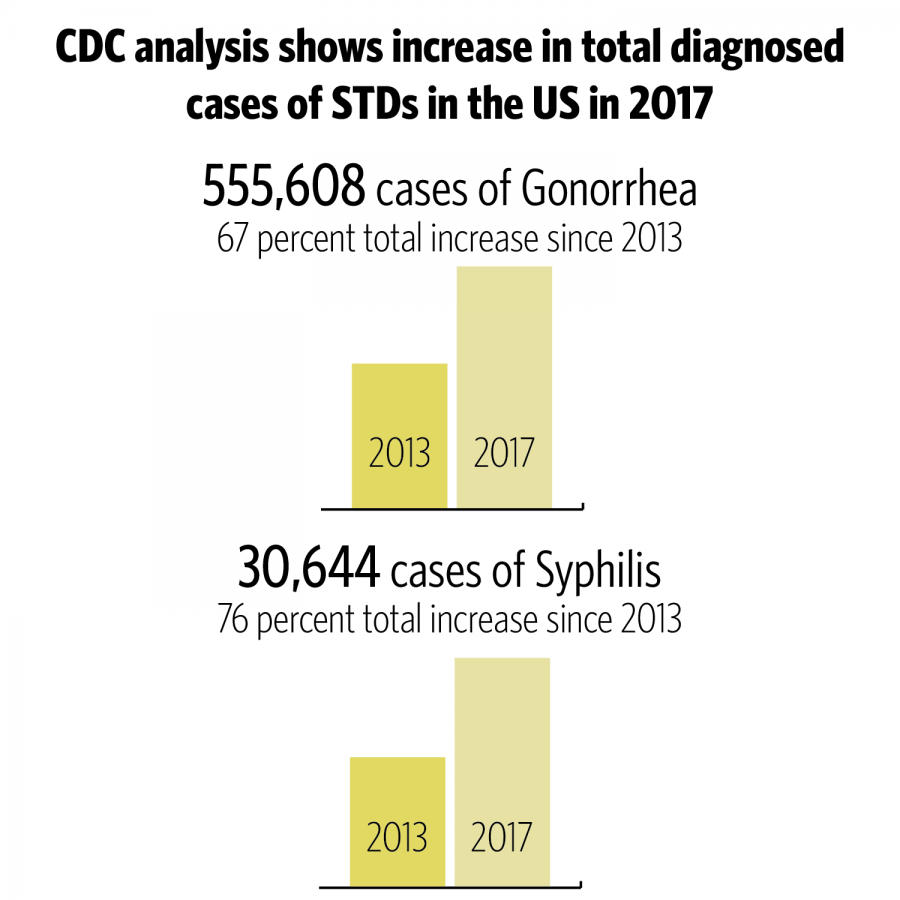Growing US STD rate calls for action
Source: Centers for Disease Control and Prevention
Dec 10, 2018
With sexually transmitted disease diagnoses in the United States increasing for the fourth year in a row, the McKinley Health Center and the Champaign-Urbana Public Health Department do what they can to address the issue.
A recent study by the Centers for Disease Control found that 2.3 million cases of chlamydia, syphilis and gonorrhea were diagnosed in the United States in 2017, surpassing the previous record by over 200,000 cases, which marked the fourth consecutive year of increase of these sexually transmitted diseases.
According to the CDC, undiagnosed and untreated chlamydia, gonorrhea and syphilis can lead to health effects such as infertility, stillborn infants and an increased risk of HIV.
Kate Donaldson, sexuality and peer education coordinator for McKinley, said increases could be due to cuts in funding for STD prevention programs at local health centers, a lack of condom usage and young people not receiving comprehensive sex education before their first sexual experience.
“We know that an individual has many options in how they choose to prevent STDs, but if they are not aware of all of the options, they may not be able to find the prevention method that works best for them,” Donaldson said.
Get The Daily Illini in your inbox!
Since taking her position, Donaldson has focused on education where students of all different backgrounds, genders, races, ethnicities and sexual orientations can feel comfortable gaining information. This focus extends education on STD prevention.
McKinley’s Sexual Health Peers, a student-led education group, leads workshops which focus on teaching students safer sex practices and pass out safe sex supplies, such as condoms, on campus. The group has led 11 workshops this semester and 34 workshops in the last academic year, Donaldson said.
Donaldson meets with students one-on-one to answer questions about STDs and other aspects of sexual health.
“We are always looking for new, creative, collaborative ways to increase availability of education and safer sex supplies. Recently, McKinley has focused on having more information available on its website and social media accounts,” Donaldson said.
Janice Walker, a case manager for the Champaign-Urbana Public Health Department, said she has seen an increase in STDs in the community but would not consider it to be an outbreak.
Candi Crause, director of adult services for the Champaign-Urbana Public Health Department, said increased access to testing and improved testing could have helped stymie the increase in STDs.
Crause said they have recently increased STD testing from eight hours to 40 hours a week to allow clients more access. This includes diagnostic and treatment services for gonorrhea, syphilis, chlamydia and other STDs. Clients will not be turned away regardless of their ability to pay.
Students can access free STD testing and treatment through McKinley’s healthcare providers, Donaldson said.
“It is my goal that the Sexual Health Program at McKinley Health Center is a space on campus where students of all races, ethnicities, genders and sexual orientations can find information that allows them to feel comfortable and confident making healthy, informed sexual choices,” Donaldson said.






